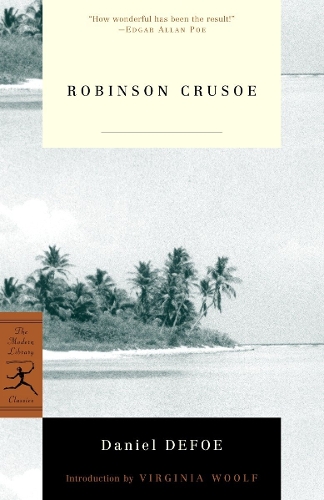
Robinson Crusoe
(Paperback)
Available Formats
Hardback
Published: 15th May 1992
Paperback
Published: 1st January 2009
Paperback
Published: 1st June 2013
Paperback
Published: 30th March 1995
Hardback
Published: 26th September 2017
Paperback
Published: 2nd January 2013
Hardback
Published: 2nd January 2014
Paperback
Published: 15th June 2001
Paperback
Published: 1st March 2007
Hardback, New edition
Published: 4th October 2021
Hardback
Published: 7th April 2021
Paperback
Published: 6th May 2008
Hardback, Reissue
Published: 1st February 2015
Paperback
Published: 1st August 2015
Paperback
Published: 15th November 2015
Paperback
Published: 1st August 2012
Paperback
Published: 20th May 2025
Paperback
Published: 5th May 1992
Paperback
Published: 25th October 2004
Hardback
Published: 5th June 2019
Publishing Details
Robinson Crusoe
By (Author) Daniel Defoe
Introduction by Virginia Woolf
Random House USA Inc
Modern Library Inc
15th June 2001
United States
Classifications
General
Fiction
Classic fiction: literary and general
823.5
Physical Properties
Paperback
320
Width 132mm, Height 203mm, Spine 17mm
266g
Description
Defoe's Classic adventure of a shipwrecked mariner surviving on his wits and ingenuity with new introduction, commentary, notes and reading group guide.
Reviews
Beyond the end of Robinson Crusoe is a new world of fiction. Even though it did not know itself to be a novel, and even though there were books that we might now call novels published before it, Robinson Crusoe has made itself into a prototype . . . Perhaps because of all the novels that we have read . . . the novelty of Defoes fiction is the more striking when we return to it. Here it is, at the beginning of things, with its final word reaching out into the future. from the Introduction by John Mullan
Author Bio
Daniel Defoe was born Daniel Foe in London in 1660. It was perhaps, ineveitable that Defoe, an outspoken man, would become a political journalist. As a Puritan he believed God had given him a mission to print the truth, that is, to proselytize on religion and politics, and in fact, he became a prolific pamphleteer satirizing the hypocrisies of both Church and State. Defoe admired William III, and his poem The True-Born Englishman (1701) won him the King's friendship. But an ill-timed satire on High Church extremists, The Shortest Way with the Dissenters, published during Queen Anne's reign, resulted in his being pilloried and imprisoned for seditious libel in 1703. At fifty-nine Defoe turned to fiction, completing The Life and Strange Surprising Adventures of Robinson Crusoe (1719), partly based on the saga of Alexander Selkirk, a Scottish sailor; Moll Flanders (1722); Colonel Jack (1722); A Journal of the Plague Years (1722); and Roxana or the Fortunate Mistress (1724).
